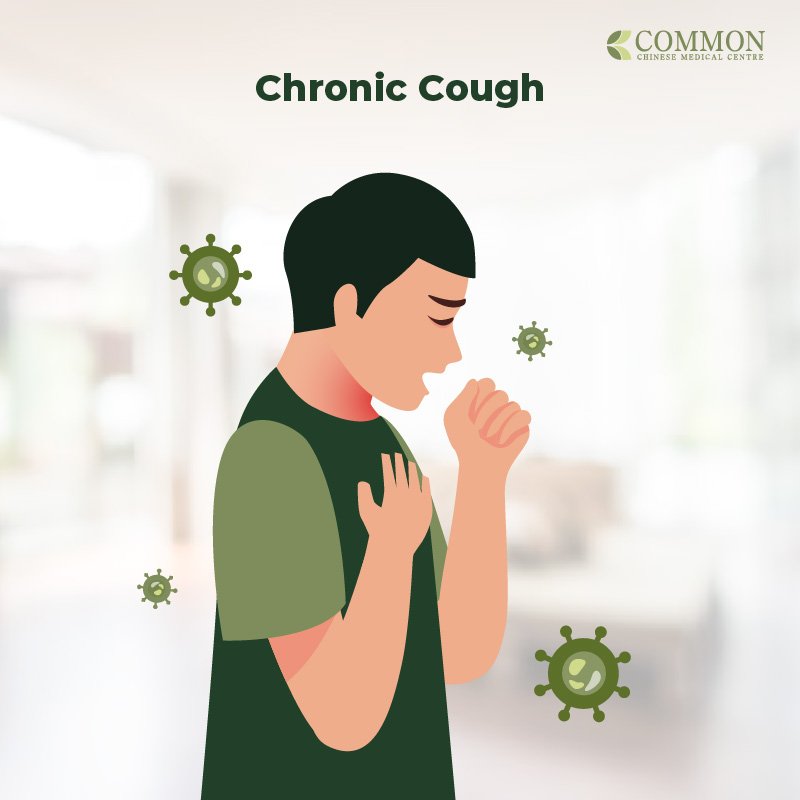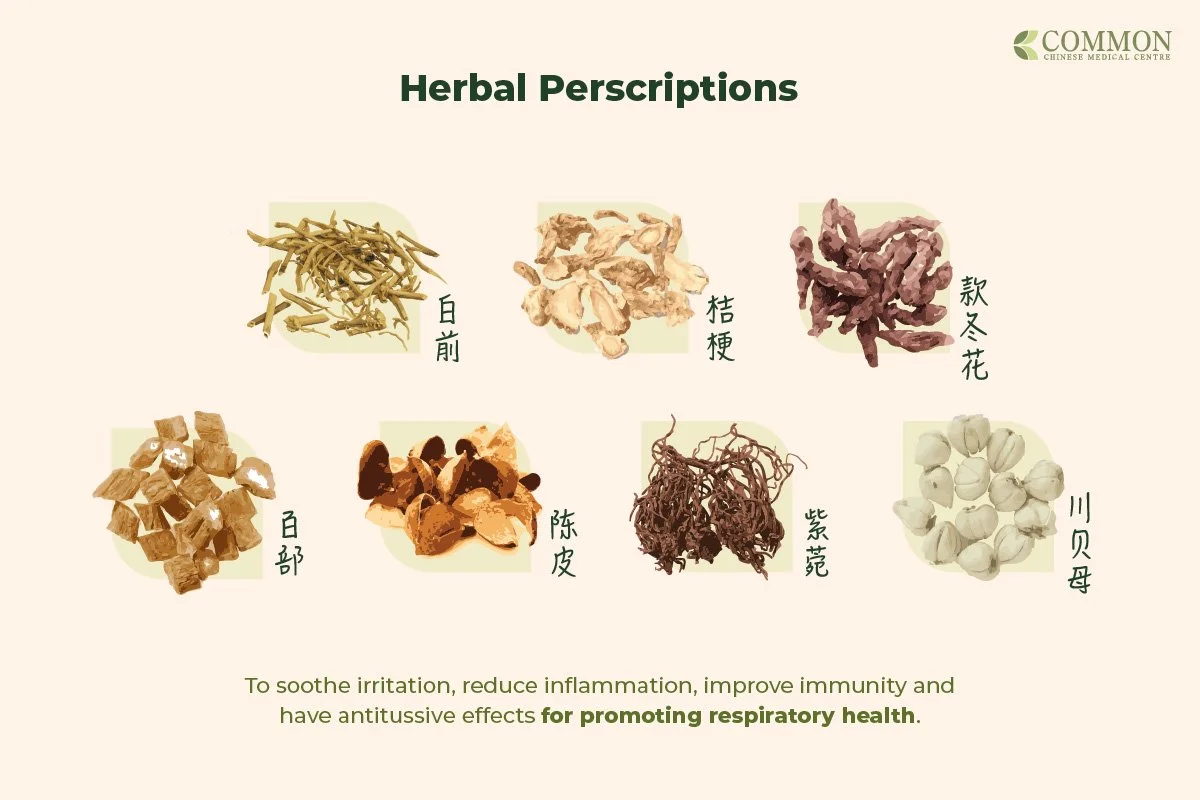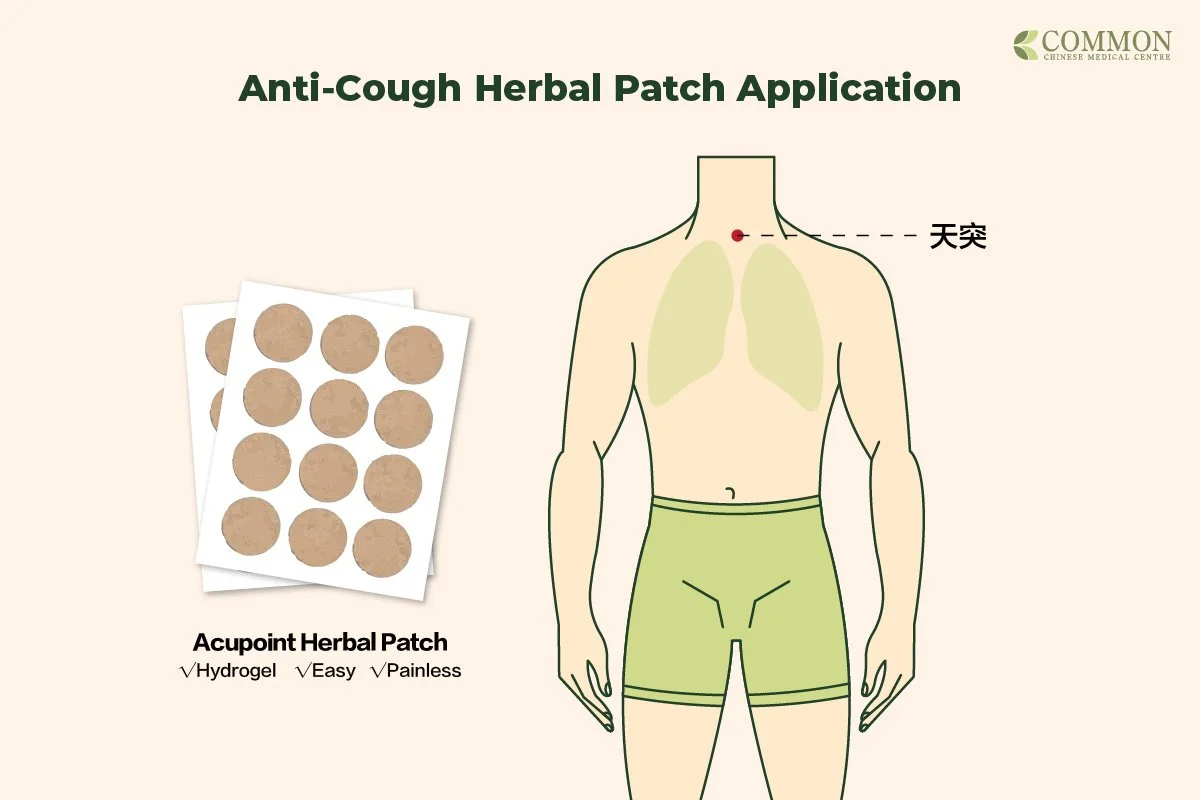Effective Management of Chronic Cough with TCM
Chronic cough, often referred to as persistent cough, is characterized by a prolonged, repetitive cough that lasts for eight weeks or more. Over time, this can impact quality of life and work productivity, leading to sleep disturbances, fatigue and lowered immunity.
Common Factors & Causes of Chronic Cough
Chronic cough is often a symptom of an underlying problem. These can include:
Respiratory Infections: Chronic cough can stem from unresolved respiratory infections.
Postnasal Drip: Excess mucus from the nose or sinuses can trigger coughing.
Gastroesophageal Reflux Disease (GERD): Stomach acid flowing back into the esophagus can cause coughing.
Asthma: Persistent cough can be an asthma symptom, especially in children.
Medications: Some medications, like ACE inhibitors, may lead to chronic cough.
Environmental Irritants: Exposure to pollutants or allergens can result in chronic cough.
In TCM, these can be summarized as a lowered immune response, resulting in a less-than-optimal recovery time.
Accompanying Symptoms:
A runny or stuffy nose
A feeling of liquid running down the back of your throat (postnasal drip)
Frequent throat clearing and sore throat
Hoarseness
Wheezing and shortness of breath
Heartburn or a sour taste in your mouth
In rare cases, coughing up blood
Diagnosing Chronic Cough:
During a TCM consultation, the physician gathers vital details concerning the persistent cough by conducting a physical examination and talking with the patient about their medical history, including the existence and color of phlegm, throat inflammation, acid reflux, nasal congestion or flu-like symptoms.
Lung imaging – A chest X-ray or even a chest CT scan may be carried out if you smoke cigarettes now or in the past, or if you have other medical issues that can impact your lungs.
Lung function testing – The clinician may carry out lung function tests to gauge how much air is flowing into and out of the lungs if asthma is suspected but not yet proven.
Testing for acid reflux – A test to determine the amount of acid in the fluid in the esophagus may be performed to support a diagnosis of acid reflux. A pH probe is the name of the test. Some people will undergo a procedure called an upper endoscopy to check for esophageal irritation and to take an esophageal biopsy.
Similar Conditions:
Conditions resembling chronic cough, such as bronchitis, allergies, chronic obstructive pulmonary disease (COPD) or lung cancer can present with chronic cough-like symptoms. Eliminating these factors through proper diagnosis is essential for effective treatment. Additionally, identifying and eliminating exacerbating factors such as smoking, exposure to irritants, or dietary triggers can contribute to managing chronic cough effectively.
The Importance of Treating Chronic Cough:
Untreated chronic cough can have profound consequences on our health. Prolonged irritation of the throat and airways can lead to complications such as:
Lung Inflammation: Chronic cough strains the respiratory system, potentially leading to inflammation and decreased lung function.
Sleep Disruption: Unrelenting coughing can disrupt sleep patterns, affecting overall well-being and energy levels.
Quality of Life: The constant discomfort of chronic cough can hinder daily activities, social interactions, and mental health.
TCM for Cough Tips:
Avoid foods that increase reflux or throat irritants, such as fried/oily or high fat foods such as chocolate, acidic juices and excessive alcohol.
Avoid cold food and drinks and keep the chest area well covered.
Avoid excessive physical exertion that significantly increases breathing rate.
Avoid lengthy conversations or remain hydrated during long presentations / work meetings.
Elevate the head of the bed six to eight inches high with pillows.
Cut down on cigarette / tobacco inhalation.
Drink a warm cup of water to expand the airways and encourage circulation.
TCM Treatments for Cough and their Mechanisms:
Traditional Chinese Medicine (TCM) offers a holistic approach to managing chronic cough. TCM practitioners focus on identifying the root causes rather than solely alleviating symptoms. Treatments may include:
Herbal Prescriptions: TCM for Cough employs herbal remedies tailored to the individual's constitution and pattern of imbalance. These herbs work synergistically to soothe irritation, reduce inflammation, improve immunity and have antitussive effects for promoting respiratory health. Some common herbs include 百部,白前,桔梗,陈皮,川贝母,款冬花,紫菀·。
2. Acupuncture: Acupuncture, a fundamental TCM technique, involves inserting fine needles at specific points to restore balance. In the case of chronic cough, acupuncture aims to regulate the flow of Qi (energy) and research shows that acupuncture can modulate immune responses and reduce airway inflammation.In this comprehensive review, it was discerned that acupuncture targeting the 足三里 acupoint confers substantial clinical benefits in alleviating inflammation through several mechanisms such as vagus nerve activation, toll-like receptor 4 (TLR4)/NF-κB signaling, macrophage polarization, mitogen-activated protein kinase (MAPK) signaling pathway, and cholinergic anti-inflammatory pathway. Another research interprets results that after 3 days of acupuncture or cupping treatment, oxygen saturation, respiratory rate and recovery time improved significantly compared to standard interventions as control. Some common acupoints include 膻中,云门,天突,尺泽。
3. Acupoint Herbal patches that contain herbal extracts are placed on selected lung meridian points to soothe airway inflammation and sensitivity.
Cough Treatment at Common TCM:
Personalized Care: Treatment plans are tailored to the individual, maximizing effectiveness.
Natural and Safe: TCM treatments are natural, safe, and free from harsh side effects.
Number of Sessions and Recovery Journey:
TCM treatments for chronic cough vary based on individual factors, the severity of the cough, and the body's response to treatment. Some individuals might experience improvement almost immediately, while others might require more extended periods for noticeable relief.
TCM takes a gradual and sustainable approach to recovery. Over time, the body's immune function and balance is restored, leading to a reduction in chronic cough symptoms.
Advisory
Individuals who are pregnant or planning to become pregnant should consult with their healthcare provider and inform the physician of their pregnancy, as certain acupuncture points may be contraindicated during pregnancy.
Most importantly, do your research and seek advice from reputable professionals for an elevated healing experience. For more information, visit our website to learn more about our treatments and physicians or book an appointment. Your well-being is our priority, and we are here to support you on your journey towards better health.
Disclaimer: This article provides general information for understanding chronic cough and the potential benefits of Traditional Chinese Medicine (TCM) treatments. It is important to note that these guidelines should not replace individualized medical advice or consultation with a qualified healthcare professional




